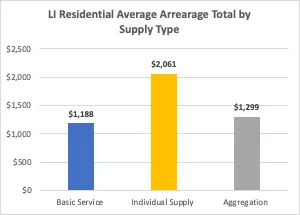Jenifer Bosco is a senior attorney at the National Consumer Law Center
Despite industry attempts to muddy the waters, years worth of data consistently shows that the sale of non-utility (or “competitive”) electric supply to individual residential customers is a bad deal for consumers. A better solution? End sales of non-utility energy supply to individual residential customers, and fight climate change more effectively with strong renewable energy portfolio standards for utilities and community choice aggregation plans.
The Wall Street Journal, no enemy of the free market, concluded that in the aggregate households have overpaid by $1 billion per year for alternative electric supply, compared to what these customers would have paid their utility companies. Data from Massachusetts, as well as Connecticut, Illinois, Maine, Maryland, New York and Pennsylvania confirm that families pay far too much when they sign up for alternative electric supply instead of sticking with their utility companies.
Cherry-picked numbers from industry-financed reports, which analyze the artificially low “teaser” rates that are offered to attract new customers but expire after several months or when contracts automatically renew, do not change the fact that a large majority of non-utility electric supply customers are paying too much. And as a 2023 report released by the Connecticut Office of Outreach, Education & Enforcement concluded, any short-term savings that appeared during recent atypical electric supply conditions are not representative, and over the past five years, consumers paid more to suppliers than they would have paid for standard offer service.
In Massachusetts, the call to halt sales of overpriced energy to families has been supported by the attorney general, the Department of Public Utilities, the former Secretary of Energy and Environmental Affairs, city and town governments, community action agencies, legal aid representatives, environmental advocates, consumer advocates and more. All voiced support for Massachusetts bill S.2106/H.3196 — the legislation to halt sales to individual households while allowing municipal aggregations to proceed.
Affordable and reliable electric service is a public health and safety necessity that impacts not just struggling families but also the entire community. The inflated electricity prices charged to most customers who sign up with non-utility energy supply companies increases the financial burdens on families while undermining utility affordability programs and ongoing efforts to help families stay connected to vital electric service.
Inflated energy prices worsen family debt burdens. During 2020, Massachusetts low-income households with non-utility energy supply faced average utility arrearages that were 73% higher than the average arrearage for low-income households who stuck with utility basic service and 59% higher than the average for low-income households with community choice aggregation plans.

But what about customers who are looking for green energy and are willing to pay a little more? Despite industry attempts to “greenwash” their products, supply contracts that purport to offer renewable energy tend to be similarly overpriced and deceptive, marking up the price of renewable energy credits that may be of low quality (for instance, a hydroelectric dam built decades ago, or a trash-burning facility located near an environmental justice community). Profiting from customer concern about the climate crisis is no way to solve the climate crisis.
In fact, competitive supply and unaffordable electricity threaten to undermine state climate goals. Families with high electric bills due to inflated prices charged by non-utility energy supply companies may be understandably hesitant to switch their home heating and appliances from gas-powered to electric. As we have learned from the Department of Energy’s Residential Energy Consumption Survey, 27% of U.S. households reported struggling with energy insecurity during 2020. Inflated electricity prices only worsen the energy affordability problem, and raise the barrier to beneficial electrification for low-income families.
High prices, greenwashing and lack of transparency are bad enough, but the list of problems continues. Marketers engaged by non-utility energy suppliers almost routinely violate state consumer protection laws in Massachusetts and other deregulated states. Aggressive telemarketers contact consumers and pose as utility company representatives to “inform” customers that “their electric rate will be changed,” and that they only need to confirm their account number to receive the purported lower rate. Elders and people with dementia have been pressured into switching to pricier contracts with suppliers. Low-income consumers are disproportionately targeted. Despite the efforts of regulators and the attorney general, these abuses continue.
Massachusetts would not be alone in taking a strong approach by ending individual residential sales of non-utility electric supply. Oregon’s electric utility restructuring law allows for sales of alternative electric supply only to commercial and industrial customers, not to residential customers. New York and Connecticut both proposed or introduced legislation that would halt residential sales. Other states such as Maryland and Illinois have taken initial steps to enact partial protections for residential utility consumers, although advocates recognize that the only way to fully protect consumers is to end the marketing and sales of non-utility energy supply to individual residential customers.
Non-utility electric supply has been around for over twenty years, yet real consumer benefits have not materialized. It is time to end this faulty and expensive experiment, and instead focus our resources on maintaining utility affordability while addressing the climate crisis.






















